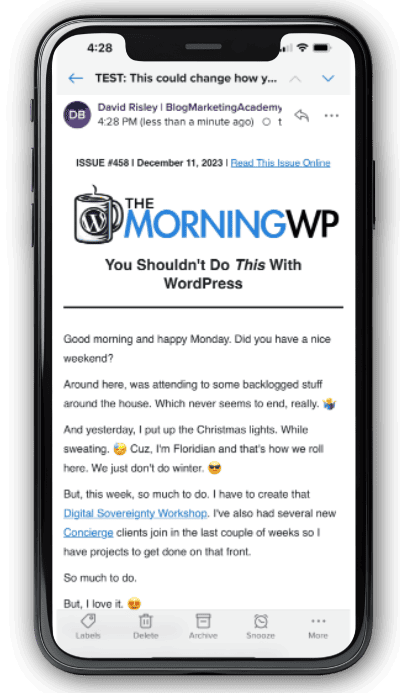Blogging, as most people think of it, takes time and effort. Time that is often found to be in short supply.
Now, it doesn’t have to be nearly as time consuming as you might think, especially if you use things like The Redwood Strategy.
But, it begs the question…
Do you even need a blog?
In order to build an online business and make money online, do you really need to have a blog at all? And, if you’re running an offline business, is it worth your time having a blog?
The answer to this question requires an understanding of “the big picture” of exactly what a blog does.
What’s The Purpose Of A Blog (For A Business)?
The first of the 10 Commandments Of Online Business is…
A blog doesn’t make any money. A business makes money.
So, the purpose of your blog isn’t to generate income since that’s just not what blogs do. Only a business that sells products or services makes money.
When it comes to making money, you are going to need to sell things. To sell things, you need people to sell to.
How are they going to find you?
In the offline world, businesses set up shop and then they need to engage in marketing and promotion to let the world know they exist. They will use local advertising, Craigslist, Facebook Ads, pamphlets, radio and the like.
In the online world, we have the same issue. How do we let people know we exist?
That’s the sole function of a blog when it comes to online marketing.
The purpose of the blog is to attract people to your business. It attracts people by offering online content that is custom tailored to them. It solves problems for them, then invites them to take the next step for more.
So, Do You Need A Blog In Order To Get Traffic?
Well, if you look at how offline businesses attract customers, they engage in various forms of advertising. But, simply sending ads to people isn’t all that effective unless the people are seeking them (as is the case with something like Craigslist or Groupon).
People don’t go around looking for ads, typically. What they’re looking for is content which is either entertaining or useful.
In other words, people are there for stuff they want. But, the ads are injected into it like a TV commercial. This is called interruption advertising. It is passive in that it just shows up to the person merely by the fact that they were looking at it.
Online, we have interruption advertising, too. It is called banner advertising. None of us ever go to a website in order to look at their ads. The ads are just there and competing for our attention.
So, you could definitely attract people to your business by way of interruption advertising. You could purchase banner ads, Facebook Ads, promoted tweets and various forms of paid traffic and you could completely bypass the need for a blog. As long as you generate more revenue than the ads are costing you, you have yourself a profitable business.
Paid traffic works very well, but there’s a catch…
See, interruption advertising is still an interruption. And more and more, consumers are in total control over their experience. They can just run ad blockers to avoid those pesky banner ads. Plus, the more people see these interruptions, the more they just go blind to it. Ads become a form of noise that they learn to dismiss.
And so, instead of relying on interruption advertising, we want to use a form of permission advertising.
Permission advertising is where we are advertising to people who have raised their hand and given us permission. In other words, they’re interested already. In fact, this doesn’t even really feel like advertising since people are coming to us.
To do that, we need to give people what they are already seeking online: content.
And, we do that with our blog, of course.
How Your Blog Will Attract People
By having a blog to serve as a marketing vehicle for your business, you will be:
- Giving the search engines something to find, thereby allowing you to show up for people who are actively searching for the kinds of issues you solve with your business.
- Giving prospects a way to get to know you before doing business with you, and do it on their terms. People prefer to do business with people they know, like and trust. Interruption advertising doesn’t build this. Blogs can.
- Able to engage in paid advertising without being annoying. Advertising content is seen to be more helpful, since you’re leading with value. For this reason, paying to promote actual blog content is usually more cost effective than simply interrupting people and sending them direct to something to buy.
Do You Need A Blog Or A Website?
I’ve had many people ask this question: blog or website?
My answer is usually this: There is no difference.
A blog IS a website. The only difference is that a blog has articles on it.
Most small business websites have essentially no reason to exist. They drop the ball because they are not designed to help ATTRACT people to the business to begin with. A typical small business site is just an informational pamphlet for the business which happens to be on the web. But, without anything there to attract new people, those business owners are left relying on outside forms of advertising.
These days, if you’re going to engage in any effective online marketing, you’ll need to create content. To do that, it is easiest to use a blog.
People often get hung up on the default, chronological nature of a blog. They think they have to blog regularly and pump out articles on a regular basis. That’s just not true. Today, a blog is nothing more than a type of content management system.
Take the dates off a blog and it is nothing more than a website with articles on it.
So, Do You Need A Blog?
The answer is no. However, without a blog, you will be solely reliant on interruption advertising to fuel your business.
To do online marketing in an efficient manner today, it is ideal to have a blog. A blog today is the online marketing home base of choice. You will still be using other forms of marketing, but it is all much more efficient when you have a hub.
Blogs started out as a platform for online journaling. And certainly, there are still many who use them that way.
But, things have evolved greatly.
Today, a blog is your branding and promotional hub. A blog is the knowledge base. It is the lead generator. It is the customer support center. It can serve numerous, central roles for any business – online or offline.
Got A Question? Need Some Assistance?
Have a question about this article? Need some help with this topic (or anything else)? Send it in and I’ll get back to you personally. If you’re OK with it, I might even use it as the basis of future content so I can make this site most useful.




